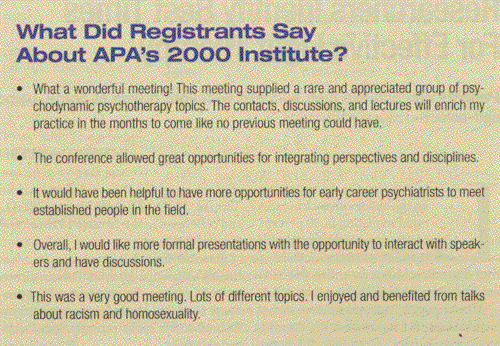APA’s Fall Institute Earns Two Thumbs Up
APA’s 2000 Institute on Psychiatric Services (IPS) drew near-record attendance and high approval ratings. The meeting was held in Philadelphia last October.
A report from APA’s Office of Continuing Education offered an in-depth analysis of the meeting and included remarks from attendees.
The institute, held each year in the fall, is characterized by a clinical focus. Interdisciplinary in nature, the meeting attracts members and nonmembers alike, and the relatively small size of the meeting encourages more discussion among registrants.
General evaluation forms were placed in all registration packets, and APA staff distributed CME and Industry-Supported Symposia (ISS) course evaluations to registrants at courses and sessions. General evaluation forms were also mailed to nonrespondents after the meeting. A total of 504 general evaluation forms was collected, and more than 1,000 CME and ISS evaluation forms were completed.
The overwhelming majority of respondents to the general evaluation form—97 percent—rated the overall quality of the educational sessions as being excellent. More than 98 percent of registrants agreed that the sessions met their educational objectives and discussed current issues.
Acting on suggestions from attendees at the 1999 institute in New Orleans, the Scientific Program Committee made some key changes to the 2000 institute. The meeting boasted more psychotherapy topics and clinical applications, more media and computer activities, and greater diversity among meeting faculty. There were also numerous sessions about the need for cultural awareness and treating homeless populations with mental illness.
Debenham noted that two of the institute’s full-day sessions were a big hit with attendees. Nearly 400 registrants attended “Mental Health Care Provider Education in HIV/AIDS” and more than 100 came to “Approaches to Working With Homeless, Mentally Ill Individuals.” The sessions were developed in collaboration with the Center for Mental Health Services and the National Resource Center on Homelessness, respectively.
The 2000 IPS was the second most highly attended institute in APA history. With an attendance of 2,141, it was second only to the 1997 institute in Washington, D.C., which had 2,181 registrants. Almost half of the registrants came from New York, Pennsylvania, and Washington, D.C.
“Registrants were attracted by a substantive clinical program with a strong interdisciplinary appeal, developed around the theme of psychodynamic psychotherapy,” observed Debenham.
The Scientific Program Committee has begun selecting sessions for the 2001 IPS. Debenham noted, “In keeping with requests from participants at the 2000 meeting, the committee will provide more sessions on psychotherapy, addictions and substance abuse, bipolar disorder diagnosis and treatment, and geriatric psychiatry.”

The next institute will be held in Orlando from October 10 to 14. More information is on APA’s Web site at www.psych.org under the institute’s logo. ▪



